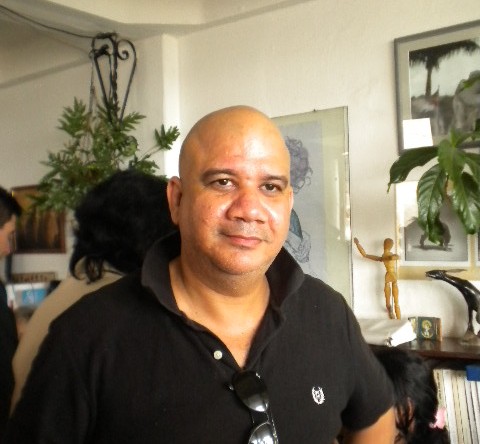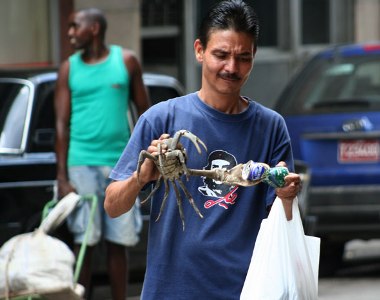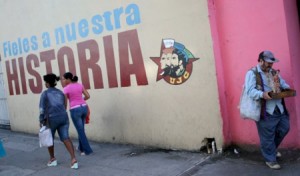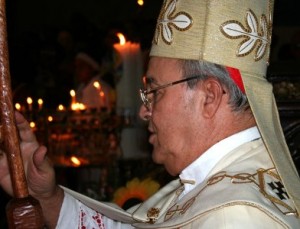 Mr. Josep Calvet:
Mr. Josep Calvet:
I have hesitated for some weeks to respond to comments that you have occasionally poured into our little forum, but recent events that will mark the fate of my country in a not-so-distant future, force me not only to answer, but also to do so publicly. My intention is, of course, to instigate debate while exposing how damaging the official propaganda has been and continues to be, and how much distortion it creates in the minds of people, including those living in the so-called society of information and democracy. I lay as a premise that, although I feel that your comments have not been disrespectful in their design, they have indeed been so in their content, as I will make clear in this letter.
A fellow countryman of yours paved the way for me when you made some statements, among them, the “subtle” difference that exists between solidarity with the people of Cuba or with its government. At this stage of the game, almost everyone knows that both positions –support for the dictatorial government of the Castro brothers or for the Cuban people- are mutually exclusive, but you obviously have not heard. And you could not find out in any way because, judging by your approach, you – in the best of cases – have been a victim of the media’s misrepresentation and manipulation that you attribute to others in your comments; the revolutionary eloquence has made you dizzy, as indicated by various symptoms: I see that your comments are profusely dotted with those ingredients that the official Cuban discourse has created and disseminated in what we might call the “Manual for collecting foreign solidarity”; its first chapter containing a main tenet: anyone who is not in agreement with the Cuban government is “without doubt or appeal” an enemy, spy, mercenary, etc., at the service of the U.S. government, ergo, he is being funded by that country’s Treasury Department. That’s why this ideal Manual abounds in acronyms used as menacing and demonic accents, such as USAID and USIS, which, by (and only by) the grace of the olive-green verbiage, become per se crime, trial and sentence. “They are funded by USAID,” “they connect to the Internet from the U.S. Interests Section,” are phrases that are used irresponsibly as you do in reference to anyone who questions the government, without considering that, because of the repetition of that chant, the supporters of the longest dictatorship in Latin America have caused the arbitrary imprisonment of many brave Cubans and has contributed to the suffering of tens of thousands of Cuban families.
And, believe me, I make an enormous effort to understand you, because it is difficult to believe so much cluelessness and such fierce indoctrination. If you even admit to not having understood many of the clarifications made in the post “A Pause,” where I explained how I connect to the Internet and the limitations we have in Cuba in order to maintain a blog while facing official harassment, how can you pretend that you do not succumb to the official propaganda machinery that has all the resources and all the power? Yet, I will not allow you to pin attributes that don’t fit me: I do not receive funding from anyone or any institution (my blog, far from being a source of income, is an expense to me), though I reserve the right to accept the personal help of friends who have occasionally offered it to me. I do not connect, nor have I ever connected from the USIS, not because I consider it sinful, but because I have not had the opportunity to do so. I do not consider it shameful to try to find in alternative sites the information and communication opportunities that the Island’s government denies me.
I understand that you do not have much knowledge about Cuban history beyond propaganda and text carefully edited by the regime. If you knew more about this country and its heroes, you would not commit such an offensive blunder as to state that this revolution is Martí-like. Be informed that José Martí was decidedly against socialism and the Marxist ideas, and that he made clear his rejection in an article entitled “La esclavitud moderna” (Modern Slavery), which was how he defined such a system. I suggest you find and carefully read this article which, by the way, the Cuban government has never released here, and which most of today’s Cubans are possibly unaware of. It so happens that you are also sadly mistaken even about this fact, when you contradict the pronouncements of the historic leader of the Cuban revolution himself, who has stated in more than one occasion that he has studied Marx since his youth, and that he read his works during his incarceration (a vacation, by the way) of a little more than a year, after rising up in arms and attacking a military barracks and causing the deaths of dozens of Cubans. For a lot less, other Cubans have faced the firing squad for the sake of “revolutionary justice.” The revolution has not really been, as you absurdly say, “a humiliation” for the U.S., but has reduced millions of Cubans to the humiliating condition of slaves.
Another glaring blunder: the Cuban people did not “rise in arms.” The guerrillas that fought the previous dictator, Fulgencio Batista (another big shot not worth talking about, but a mere amateur compared to Castro), consisted of only a few thousand Cubans, although it is true that the revolution, in its initial years in power, had resounding and massive popular support. The ICAP*, meanwhile, has not “existed for fifty years” as you claim, but was founded in the 1970’s as an institution created to support the government, not the people of Cuba. But don’t be embarrassed by a wrong date, which is not all that important, nor elementary. It is not surprising that someone who believes that an example of great altruism and solidarity is participating in a harvest of cooking bananas that will feed revolutionaries and dissidents alike is confused. That’s scarcely a symbolic gesture. I know that we Cubans have the widespread reputation for making light of things, but be informed that many of us cherish our freedom infinitely more than fried plantains.
On the other hand, let me inform you, Mr. Calvet, that your farm sacrifice does not impress me. Since the early age of 12 until I was 17, for six consecutive school years, I had to participate in agricultural tasks, separated from my family for 45 days each year, incorporated into that monstrosity of the revolution known as the Field Schools. I could not enumerate the number and variety of foods and vegetables I harvested, weeded, fertilized and even sowed, and none of it meant any improvement in my life. Contrary to what many believe, what we need here is Freedom, not foodstuffs. Not all Cubans have the brains of a pig.
As for your comment about the Ladies in White, whom you rudely described as “a crude imitation” of the Grandmothers of the Plaza de Mayo, it is a heinous insult. As woman, mother and grandmother, I will not let you get away with such a transgression. Dictatorships, whether right or left, remain dictatorships. The Argentine Grandmothers you mention deserve all of mankind’s respect and consideration, but, in equal measure, the Ladies in White have given the world in general and Cuba in particular an unforgettable lesson in dignity. Know that their struggle is more valuable than that of the guerrillas in the Sierra Maestra, because they have confronted the longest dictatorship in this hemisphere in the midst of the city and openly, not hiding in the thicket, not chasing after privileges and power, but demanding the release of husbands, brothers and children captive of the system, not with weapons, but with flowers in their hands, with truths and rights, not killing other Cubans, but marching peacefully through the streets, confronting the fascist hordes organized and financed by the government to suppress and beat them, and chanting a word that should be sacred to all human beings: freedom.
The Ladies in White have the extraordinary merit of being the first civic movement in the history of this country that has achieved an unprecedented victory against the government by sheer force of their will and of the righteousness of their cause. They do not need to imitate anybody, because they are authentic. Today, the Cuban government itself belies you and leaves you exposed for all to see.
I would suggest you go to the Official Cuban Gazette website to find out about the new law that grants the state the right to sell the land it owns (it owns virtually all lands) to construction companies for tourism purposes (Law-Decree 273, Articles 221 and 222.1, published August 13th, 2010), with 99-year leases and also to make sales with rights in perpetuity. It states, explicitly, that the law was enacted “For the purpose of expanding and facilitating the process of foreign investment participation in international tourism.”.
What The Gazette does not state is that this Law-Decree was created expressly to legitimize investments that some American companies are anticipating, in order to build more than a dozen golf courses for the exclusive tourism of millionaires, which is not, in itself, necessarily something negative, only that we citizens are excluded and do not have the right to invest or acquire land to participate in development plans of any kind. That is, we cannot be capitalists, but the state capitalism that prevails in this country gives itself the right to sell the country off in pieces, as if it were a birthday cake, with Cubans not taking any part in the festivities.
I do not know if Mr. Calvet will also perceive the subtlety that preferential buyers who will enjoy the privileges of ownership are precisely the “imperialist enemy” that attacks us, blocks us and harasses us, the same one that — so-called “illegally” — occupies the naval base at Guantánamo. The truly peculiar thing is that, if the base exists today, it is by virtue of an amendment that granted a foreign government the privilege of owning Cuban territory, promoted on the dawn of the twentieth century by an American politician. This new one, which gives away our country to American entrepreneurs and has been designed and imposed on the Cubans by the government of Cuba itself, is the “Castro Amendment.” Contrast this law with one published before it in the same Gazette, giving peasants the land they work and produce with their own hands “in usufruct for a term of 10 years.” It is not necessary to be an astute individual to detect who the owners of power in Cuba are codling, plus let’s not mention the mysterious fate of the proceeds from such sales.
As you can see, Mr. Calvet, the Official Gazette itself is responsible for confirming what “we, mercenaries” are saying. As you may see, additionally, it is a brazen impertinence for you to try to indoctrinate me about the needs of the Cuban people. Unlike the olive-green royalty that you so passionately defend, the same one who so anxiously share in the spoils of the country, I am part of this people, deprived of rights and hopes. How can you have the audacity to point out to the Cuban people what we need and against whom we need to fight? You are definitely clueless: over a century has passed since 1898, my good man, though I suspect that date means absolutely nothing to you.
As I stated at the beginning, Mr. Calvet, your fellow countryman has taken the responsibility to respond with dignity to your twisted interventions in this space. He gives you the benefit of a doubt; I wish I could do the same, but I keep some reservations, because if you allow yourself the suspicion of considering independent bloggers as paid by the U.S. government, you might be giving me the right to assume you are a paid employee of the discredited and despotic Cuban government, which is in the business of buying the world’s solidarity while mortgaging the present and future of this Island and of Cubans. At any rate, I appreciate your participation in this blog, but you lack the moral authority to judge those who are not in love with this government. If you have any intention to participate in this debate again, be truly respectful: do yourself a favor and get informed about the Cuban reality, arm yourself with arguments, and, above all, save yourself the slogans.
Sincerely,
Miriam Celaya
* Cuban Institute for Friendship with the Peoples
Translator: Norma Whiting
September 9, 2010





 Mr. Josep Calvet:
Mr. Josep Calvet: Since I am not always home when the news comes on, and taking into account that information is an integral and offshoot component of one’s opinion, a few years ago I negotiated with a kind neighbor for the possibility of getting a secret subscription to the newspaper Granma. For a long time she has been friends with man who brings her the newspaper each morning. Cuban readers probably know that a clandestine subscription consists in coordinating with one of those retired old men who, in order to round out their meager pensions, agree to hoard the newspapers as they arrive at the newsstands, after having arranged with the official salesperson –the intermediary, who reserves a fixed number of papers each day- so that, for the modest monthly fee of 30 pesos (regular currency, of course) you can get one or another pastoral letter of the communist party which, with a different name and printing, repeat more or less the same thing.
Since I am not always home when the news comes on, and taking into account that information is an integral and offshoot component of one’s opinion, a few years ago I negotiated with a kind neighbor for the possibility of getting a secret subscription to the newspaper Granma. For a long time she has been friends with man who brings her the newspaper each morning. Cuban readers probably know that a clandestine subscription consists in coordinating with one of those retired old men who, in order to round out their meager pensions, agree to hoard the newspapers as they arrive at the newsstands, after having arranged with the official salesperson –the intermediary, who reserves a fixed number of papers each day- so that, for the modest monthly fee of 30 pesos (regular currency, of course) you can get one or another pastoral letter of the communist party which, with a different name and printing, repeat more or less the same thing.







